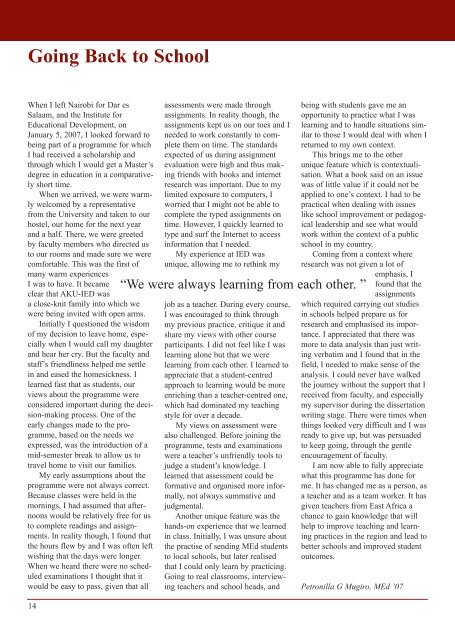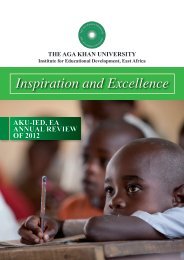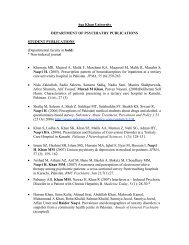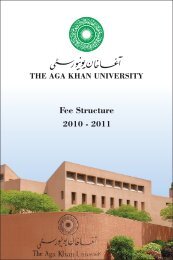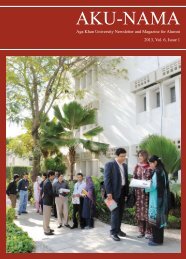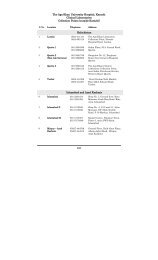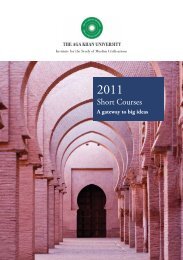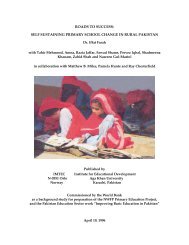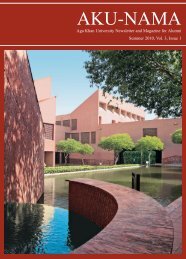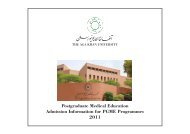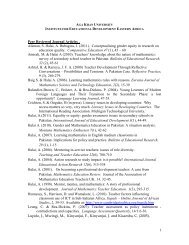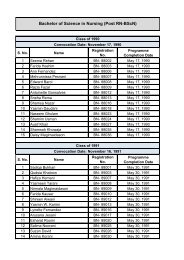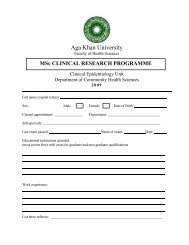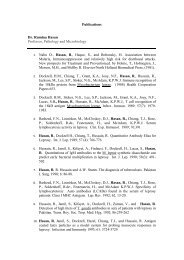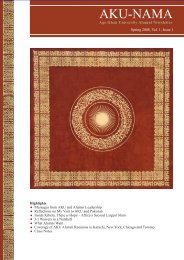Winter 2008, Vol. 1, Issue 2 - Aga Khan University
Winter 2008, Vol. 1, Issue 2 - Aga Khan University
Winter 2008, Vol. 1, Issue 2 - Aga Khan University
Create successful ePaper yourself
Turn your PDF publications into a flip-book with our unique Google optimized e-Paper software.
Going Back to School<br />
When I left Nairobi for Dar es<br />
Salaam, and the Institute for<br />
Educational Development, on<br />
January 5, 2007, I looked forward to<br />
being part of a programme for which<br />
I had received a scholarship and<br />
through which I would get a Master’s<br />
degree in education in a comparatively<br />
short time.<br />
When we arrived, we were warmly<br />
welcomed by a representative<br />
from the <strong>University</strong> and taken to our<br />
hostel, our home for the next year<br />
and a half. There, we were greeted<br />
by faculty members who directed us<br />
to our rooms and made sure we were<br />
comfortable. This was the first of<br />
many warm experiences<br />
I was to have. It became<br />
clear that AKU-IED was<br />
a close-knit family into which we<br />
were being invited with open arms.<br />
Initially I questioned the wisdom<br />
of my decision to leave home, especially<br />
when I would call my daughter<br />
and hear her cry. But the faculty and<br />
staff’s friendliness helped me settle<br />
in and eased the homesickness. I<br />
learned fast that as students, our<br />
views about the programme were<br />
considered important during the decision-making<br />
process. One of the<br />
early changes made to the programme,<br />
based on the needs we<br />
expressed, was the introduction of a<br />
mid-semester break to allow us to<br />
travel home to visit our families.<br />
My early assumptions about the<br />
programme were not always correct.<br />
Because classes were held in the<br />
mornings, I had assumed that afternoons<br />
would be relatively free for us<br />
to complete readings and assignments.<br />
In reality though, I found that<br />
the hours flew by and I was often left<br />
wishing that the days were longer.<br />
When we heard there were no scheduled<br />
examinations I thought that it<br />
would be easy to pass, given that all<br />
14<br />
assessments were made through<br />
assignments. In reality though, the<br />
assignments kept us on our toes and I<br />
needed to work constantly to complete<br />
them on time. The standards<br />
expected of us during assignment<br />
evaluation were high and thus making<br />
friends with books and internet<br />
research was important. Due to my<br />
limited exposure to computers, I<br />
worried that I might not be able to<br />
complete the typed assignments on<br />
time. However, I quickly learned to<br />
type and surf the Internet to access<br />
information that I needed.<br />
My experience at IED was<br />
unique, allowing me to rethink my<br />
job as a teacher. During every course,<br />
I was encouraged to think through<br />
my previous practice, critique it and<br />
share my views with other course<br />
participants. I did not feel like I was<br />
learning alone but that we were<br />
learning from each other. I learned to<br />
appreciate that a student-centred<br />
approach to learning would be more<br />
enriching than a teacher-centred one,<br />
which had dominated my teaching<br />
style for over a decade.<br />
My views on assessment were<br />
also challenged. Before joining the<br />
programme, tests and examinations<br />
were a teacher’s unfriendly tools to<br />
judge a student’s knowledge. I<br />
learned that assessment could be<br />
formative and organised more informally,<br />
not always summative and<br />
judgmental.<br />
Another unique feature was the<br />
hands-on experience that we learned<br />
in class. Initially, I was unsure about<br />
the practise of sending MEd students<br />
to local schools, but later realised<br />
that I could only learn by practicing.<br />
Going to real classrooms, interviewing<br />
teachers and school heads, and<br />
being with students gave me an<br />
opportunity to practice what I was<br />
learning and to handle situations similar<br />
to those I would deal with when I<br />
returned to my own context.<br />
This brings me to the other<br />
unique feature which is contextualisation.<br />
What a book said on an issue<br />
was of little value if it could not be<br />
applied to one’s context. I had to be<br />
practical when dealing with issues<br />
like school improvement or pedagogical<br />
leadership and see what would<br />
work within the context of a public<br />
school in my country.<br />
Coming from a context where<br />
research was not given a lot of<br />
emphasis, I<br />
found that the<br />
assignments<br />
which required carrying out studies<br />
in schools helped prepare us for<br />
research and emphasised its importance.<br />
I appreciated that there was<br />
more to data analysis than just writing<br />
verbatim and I found that in the<br />
field, I needed to make sense of the<br />
analysis. I could never have walked<br />
the journey without the support that I<br />
received from faculty, and especially<br />
my supervisor during the dissertation<br />
writing stage. There were times when<br />
things looked very difficult and I was<br />
ready to give up, but was persuaded<br />
to keep going, through the gentle<br />
encouragement of faculty.<br />
I am now able to fully appreciate<br />
what this programme has done for<br />
me. It has changed me as a person, as<br />
a teacher and as a team worker. It has<br />
given teachers from East Africa a<br />
chance to gain knowledge that will<br />
help to improve teaching and learning<br />
practices in the region and lead to<br />
better schools and improved student<br />
outcomes.<br />
“We were always learning from each other. ”<br />
Petronilla G Mugiro, MEd ’07


